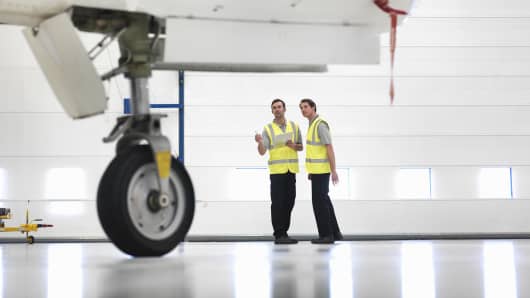
British lawmakers have issued a stark warning over Brexit’s potential impact on the country’s aerospace industry.
The sector accounts for 7 percent of the U.K.’s manufacturing output and is dominated by Boeing, Airbus and Rolls-Royce. Bombardier, GKN and Leonardo Helicopters are also major employers.
A House of Commons report released Monday by the Business, Energy and Industrial Strategy Committee has claimed that divergence from European Union (EU) rules and no free trade deal would be “utterly self-defeating” for the aerospace industry.
ADS Group, a trade organization representing the U.K.’s aerospace and defense industry, submitted that additional checks at the EU border could cost the industry £1.5 billion ($2.1 billion) each year.
And the Royal Aeronautical Society, which also provided evidence, claimed suppliers in European aerospace supply chains compete in large part on speed as well as cost.
“The penalties for not getting there on time are very severe, and therefore these non-tariff barriers can very quickly drive up costs,” the report said.
The body of cross-party politicians said given the concerns, U.K. negotiators should secure a “near frictionless” trade deal for the sector to avoid disruptive border delays.
The report further explained that the U.K. aerospace industry is trade-oriented with annual exports approximately totaling $15 billion each year and imports worth around $14 billion.
Regulatory alignment with the EU is also sought by the lawmakers, who called on the United Kingdom to remain a member of the European Aviation Safety Agency (EASA). EASA dictates safety rules and certifies parts across Europe, helping to lower costs of certification and increase integration within the industry.
“Close global regulatory alignment in aerospace has resulted in benefits in terms of safety, the ease of global trade and efficiency, while it is unclear that there are any benefits from divergence at this time,” the report said.
In a speech earlier this month, U.K. Prime Minister Theresa May said her government would explore the terms on which Britain could remain part of EASA.
The EU said Monday that it has agreed on the broad terms of the two-year transition period after the U.K. exits Europe on March 29, 2019.
[“Source-cnbc”]





